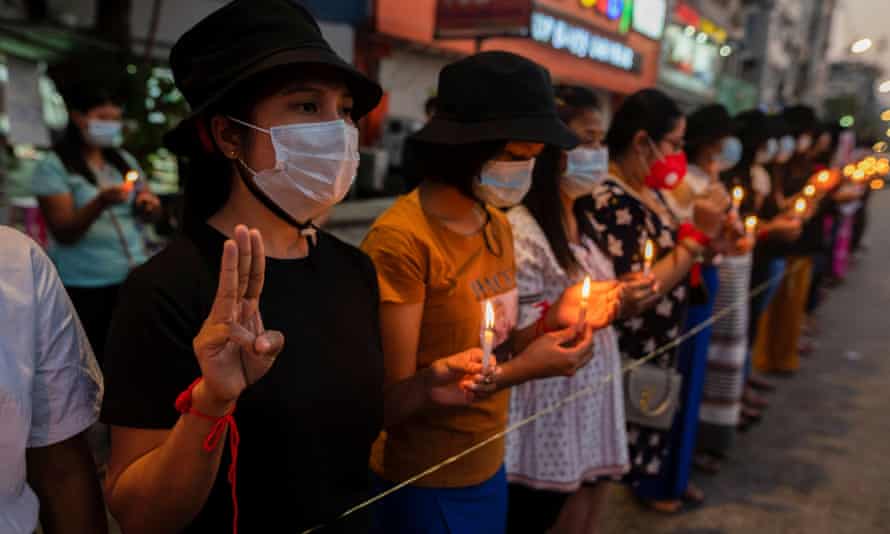Fresh protests in Myanmar as Aung San Suu Kyi appears in court | Global development
Thousands of people have taken to the streets of Myanmar’s main city Yangon on Wednesday morning to voice their anger against the coup, after a fresh charge was announced against ousted leader Aung San Suu Kyi.
The deposed state counsellor, who has not been seen in public since the coup on 1 February, appeared in court by video link on Tuesday, her lawyer said.
Across Yangon, protesters marched with red flags signalling their support for their elected government, and carried signs denouncing the military. Roads were blocked by sit down protests, and by drivers who held a “broken down” protest, parking their cars with bonnets open.
“We will never lean down under the military boots,” one banner read.
United Nations special rapporteur on Myanmar, Tom Andrews, said ahead of the rallies that he had received reports of soldiers being transported into the main city Yangon from other regions, adding that he feared “we could be on the precipice of the military committing even greater crimes against the people of Myanmar”.
“In the past, such troop movements preceded killings, disappearances, and detentions on a mass scale,” he said.
There were no signs of a strong military presence in Yangon on Wednesday morning.
About 1,000 university staff and students gathered outside the Secretariat, a sprawling colonial era that once served as the administrative centre for British Burma, to demand the release of Aung San Suu Kyi.
“I want Daw Aung San Suu Kyi, my president U Win Myint, and other leaders freed immediately,” said a retired teacher. “We want our democracy back.”
Aung San Suu Kyi has not been seen in public since she was detained more than two weeks ago. Her lawyer, Khin Maung Zaw, said that police had submitted charges against her to the court on Tuesday, including a new allegation that she violated a national disaster law by breaching Covid regulations during last year’s election. Aung San Suu Kyi was already accused of illegally importing walkie talkies.
Khin Maung Zaw said he was not informed in advance of the court hearing and so missed the proceedings. “As soon as we heard about it, we [lawyer and the National League for Democracy’s central executive committee] joined the video conference, but it was already over. The judge then explained what had happened,” he said.
He was not given notice, he added, because he has not yet been officially recognised as Aung San Suu Kyi’s lawyer. He has not been granted permission to speak to her.
It is not clear how long a future trial might take, he added, but it could last for more than one year.
More than 450 people have been arrested since the coup on 1 February, while the military has repeatedly blocked communications. On Tuesday, an internet blackout was imposed for the third night running, according to the monitoring group NetBlocks.

Protests have taken place daily since the military seized control more than two weeks ago, with crowds taking to the streets in big cities and remote villages across the country. Public fury at the army has been fuelled even further by news of Aung San Suu Kyi’s court hearing and by a junta press conference, in which the military promised to hold elections. The last period of direct army rule lasted about half a century.
The military has justified seizing power by alleging widespread voter fraud in November elections won by Aung San Suu Kyi’s party, a claim dismissed by observers.
Military spokesman Zaw Min Tun said on Tuesday that both Aung San Suu Kyi and Win Myint were in a “safer place” and “in good health”. “It’s not like they were arrested – they are staying at their houses,” the general, who became the country’s vice-minister of information after the coup, told a press conference. Their next court hearing is scheduled for 1 March.
The US, which has announced targeted sanctions against the generals, condemned the new charge against Aung San Suu Kyi, and renewed calls for her release.
China did not initially criticise the coup, however the country’s ambassador to Myanmar Chen Hai said on Tuesday that “the current development in Myanmar is absolutely not what China wants to see”. He added that China had not been informed in advance that the military was planning to seize power.
Security forces have used increasing force to stop nationwide street protests and a disobedience campaign encouraging civil servants to strike. Rubber bullets, tear gas and sling shots have been used against protesters, and troops have fanned out around the country in recent days.
Protests in Yangon on Tuesday, the 11th straight day of demonstrations, were smaller than in previous days but strategically targeted. Student activists have gathered at the major Myaynigone Intersection while another rally was held outside the US embassy.
Pockets of protesters also held rallies outside government offices including the Central Bank, Myanmar Port Authority and the Customs Department, to pressure civil servants to join a civil disobedience movement that is crippling commercial and government functions and resisting efforts by the military to restore normality.
